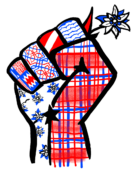Topic: Lessons from 30 years of letter bombs against Austrian minorities and five years of Black Lives Matter in Austria
Programm auf Deutsch
Moderation: Beverly Mtui, freshVibes, Radio ORANGE 94, Vienna
Greetings
- Carsten Schneider, Vice-Rector of the Central European University
- Martin Fritz, Secretary General of the Austrian UNESCO Commission
- simon INOU, initiator and organizer
Opening speeches
- Manuela Horvath, Head of Roma Pastoral Care in the Diocese of Eisenstadt
- Tayla Myree, activist and independent researcher, Vienna
- Theodora Manolakos, Head of the Integration and Diversity Department of the City of Vienna
Talks, panel discussions, presentations
10h40 Multilingualism was the thematic focus of the City of Vienna’s Integration and Diversity Department in 2024 – What lessons can we learn from this? A presentation by Emel Aldirmaz, City of Vienna – Integration and Diversity, Regional Office North-East – presented by City of Vienna.
11h Austria’s large companies and anti-racism work – The strategies and network work of the Austrian Federal Railways (ÖBB). Why anti-racism work is crucial for a company. With Eva Ortner and Naomi Ossai from the Inclusion & Diversity Solution Center at ÖBB. Moderation: Marie-Edwige Hartig, Women Association Jaapo in Linz
11h30 30 years of community radios and 15 years of the press council new in Austria – 100 years of radio, 30 years of community radios and 15 years of self-regulation of the Austrian press: Is non-discriminatory media reporting possible in Austria? Experiences from everyday media life with Helga Schwarzwald, Managing Director of the Austrian Association of Free Broadcasting and Alexander Warzilek, Managing Director of the Austrian Press Council. Moderation: Nahla Hamula, Falter
12h15 Break
12h30 “Racialization and unequal between the Global North and South” – We link present-day unequal exchange between the Global North and South to underlying colonial and imperial power relations. This oppression and violence, we argue, is linked to practices of racialization and marginalization [ presented by Ambika Sairam and Anke Schaffartzik, CEU]
Main Focus – Antiracism in Salzburg
13h Human zoos and ethnological exhibitions in Salzburg – How do we deal with the legacy? – Although Austria had no colonies of its own, it was heavily involved in colonialism. A particularly inhumane example of this are the so-called “human zoos” or “Völkerschauen”, where colonized people were put on commercial display. Between 1870 and 1910, more than 50 such “Völkerschauen” took place in Vienna. It is often forgotten that beyond the European capitals like Vienna or Paris, where many human exhibitions took place, people were also exhibited in rural areas for amusement and humiliation. PH professor Elfriede Windischbauer discovered that a total of 32 human exhibitions took place in Salzburg up until 1951. In an interview with historian and journalist Vanessa Spanbauer, she explains how this came about and how our society should deal with this legacy.
14h What does it mean to be active in anti-racism work in Salzburg? Experiences from everyday life. In cooperation with the Afro-Asian Institute Salzburg. An exchange with Christine Bayer-Borrero from BIPOC Circle and teacher at the St. Gilgen International School and Selina Oberortner from the Anti-Discrimination Office in the City of Salzburg. Moderation: simon INOU, blackaustria.info
14h50 Break
15h Antiracism and plurality in and with children’s and young adult books – More and more publishers in German-speaking countries have discovered a new market for themselves: children’s and young adult books that focus on diverse representation and promote the active participation of members of non-white communities. Is this a gap in the market, a temporary phenomenon or a long-term development? Discussion with author Melanie Kandlbauer and Arwa Elabd, teacher and bookstore owner – Moderation: Remi Tchokothe, University of Vienna
16h Racism in Decolonization Movements? – Racism remains an ever-enduring foe because it is so latent. It can emerge in all contexts and groups, marking difference as a reason to discriminate between in and outgroup. This talk reflects on common forms of racism and dangers of new modalities of it through decolonization tropes. Daniel Palm led the decolonization working group in the Academics Facing Autocracy Program at the CEU Democracy Institute in Budapest and invites through personal reflection to explore rather than obscure modalities of racism ways to react to them constructively. [presented by Daniel Palm, CEU]
